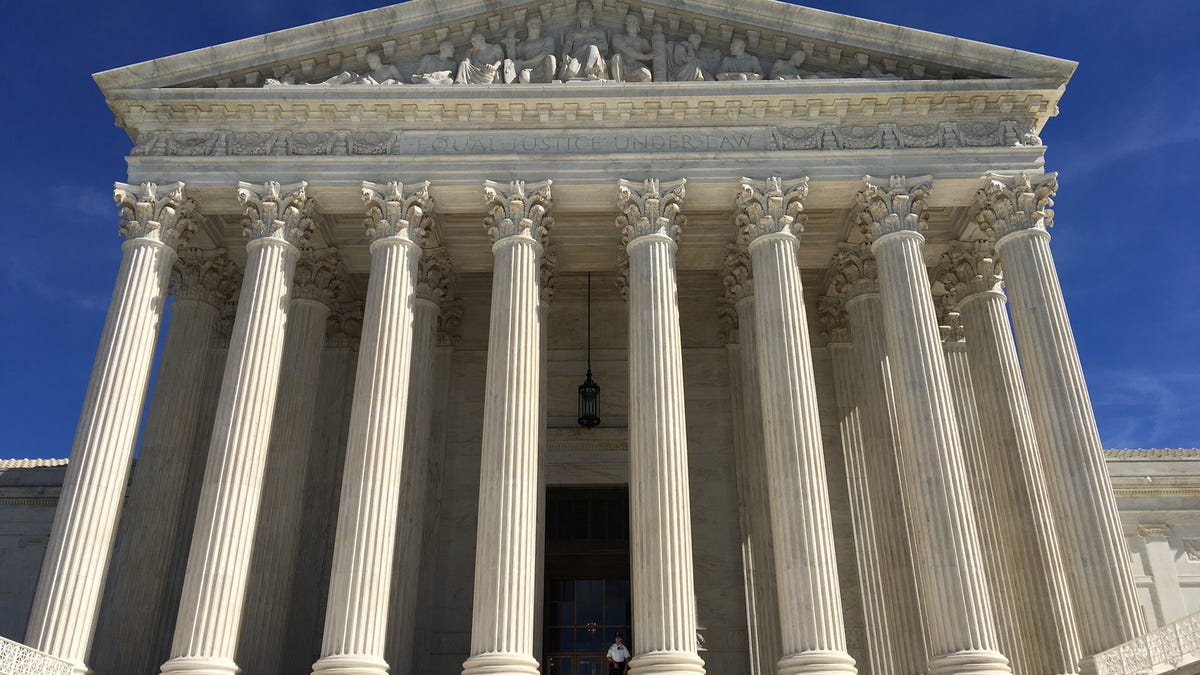Apple: Supreme Court shouldn't consider another Samsung case
Samsung in March asked the nation's highest court to reconsider a ruling in a trial involving the iPhone's slide-to-unlock and autocorrect features.

There's no need for the Supreme Court to get involved in Apple v. Samsung again, at least according to Apple.
The iPhone maker on Monday filed its response to a Samsung petition for the nation's highest court to consider yet another aspect of the two companies' long-running patent dispute. Samsung in March asked the Supreme Court to look at a 2014 verdict that awarded Apple $120 million for Samsung's patent infringement.
Apple, in its filing Monday, argued that the lower court's ruling was correct and that the case wasn't worth consideration by the Supreme Court because the patent laws themselves weren't in dispute. It also said that even if the issues were in dispute, the case isn't a good one to use for setting new legal precedent.
"Samsung's petition challenges two Federal Circuit decisions, neither of which implicates any broad or disputed question of substantive patent law," Apple said in its filing. "The petition should be denied."
Apple didn't have a comment beyond its filing. Samsung didn't have a comment about Apple's filing. In March, the South Korean electronics giant said: "We hope the US Supreme Court will grant our petition, which will put competition back where it belongs -- in the marketplace, not in the courtroom. If granted, the Court can ensure there is a fair legal environment that fosters innovation for businesses of all types and sizes."
Apple and Samsung have been battling over patents since 2012, and a question about how much money could be owed for infringing design patents made it all the way to the Supreme Court in October 2016. In December, the Supreme Court said in a unanimous opinion that damages for design patent infringement can be based only on the part of the device that infringed the patents, not necessarily on the entire product. It sent the case back to a lower court to redetermine the damages.
SCOTUS 2.0?
In March, Samsung filed another request, called a writ of certiorari, with the Supreme Court (this is its third). This time, it asked the justices to reconsider a Federal Circuit ruling that said it had to pay Apple $120 million for infringing Apple's smartphone patents. That case involved Apple's slide-to-unlock, autocorrect and quick links patents.
Apple originally won $120 million in a trial in early 2014, but a US Circuit Court of Appeals threw out the verdict in February 2016. At that time, the panel of three judges said that Samsung didn't infringe the quick links patent and the other two patents were invalid because they covered obvious innovations. An en banc Federal Circuit court reinstated the verdict in October, though.
In its filing to the Supreme Court in March, Samsung said that its petition arose "from a pair of deeply divided decisions by the Federal Circuit that make critical changes in several of the most frequently litigated issues of patent law: obviousness, injunctive relief and infringement." It argued that the Federal Circuit's reinstatement of the $120 million judgment was made without allowing briefing or arguments by the parties and it was done over the dissent of all three court panel members.
"Because no other circuit can consider the important patent issues here, and because the Federal Circuit was so deeply divided and followed such troubling procedures, this Court should grant certiorari," its filing said.
Other organizations -- including the Software & Information Industry Association (SIIA), Internet Association, Hispanic Leadership Fund and the National Grange of the Order of the Patrons of Husbandry -- last month filed amicus briefs in support of Samsung's request.
The SIIA, for one, argued that Supreme Court precedent says the "obviousness" of a patent should be decided by a judge and that the en banc Federal Circuit decision went against that (in this case, an appeals court had invalidated two Apple patents because it said they were obvious. The Federal Circuit reversed that).
The Federal Circuit "has made clear, with its en banc decision, it is paying little more than lip service to this principle," Chris Mohr, vice president for intellectual property and general counsel for SIIA, said last month. "Ironically, its decision resurrects all the concerns that warranted the Supreme Court visiting these issues several years ago."
Apple's filing was earlier spotted by Foss Patents.
Does the Mac still matter?Apple execs tell why the MacBook Pro was over four years in the making, and why we should care.
Virtual reality 101: CNET tells you everything you need to know about VR.

